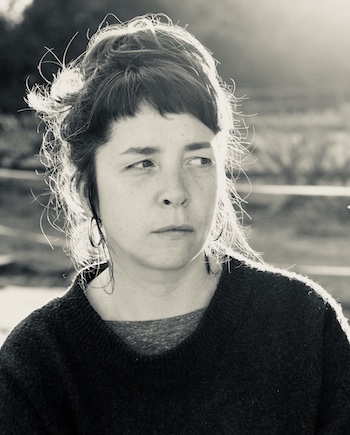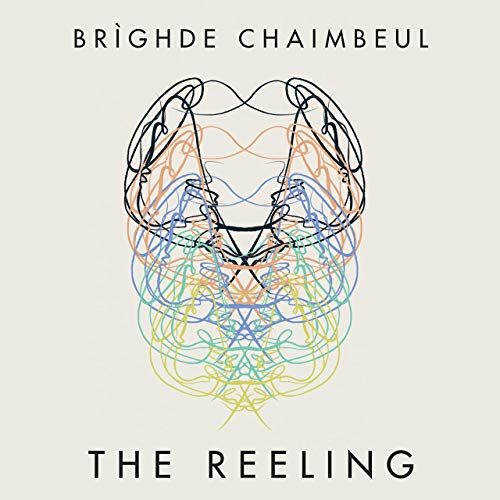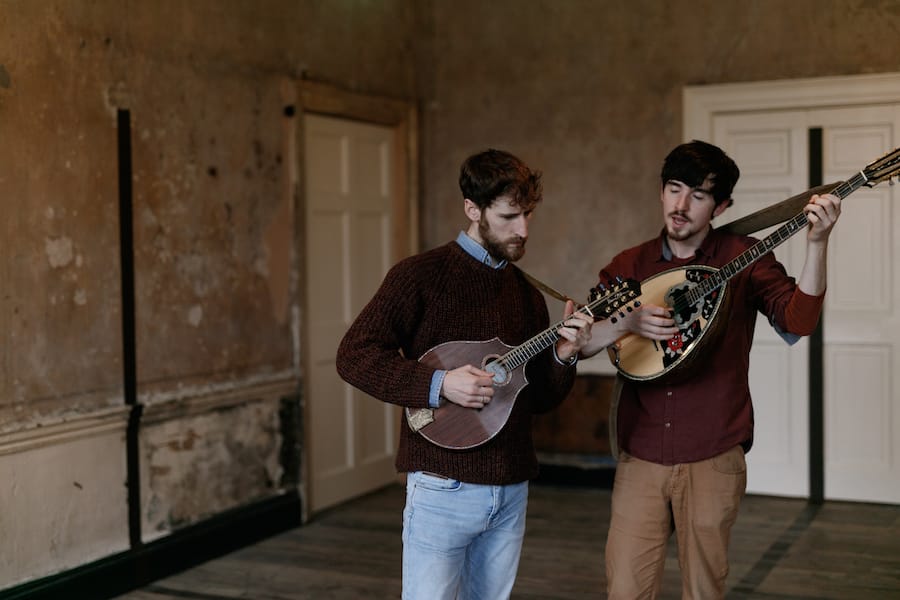By now, the names of Lisa O’Neill, Ye Vagabonds and Brìghde Chaimbeul will be more than familiar to most of our readers. Besides recently picking up six BBC Folk Award Nominations, the other thing they all share in common, beyond creating brilliant music, is their record label – River Lea. The label is run by Geoff Travis & Jeannette Lee of Rough Trade along with music journalist Tim Chipping who recently took some time out to talk to me about the label and how it came to be.
For want of a better word, Tim is clearly a ‘music head’ and in the course of the interview acknowledges that he has “spent the last 30 years going to gigs several times a week and spending more on records than food.” His insatiable pursuit of newer, better music is one he shares with the Geoff & Jeannette whose path he was continually crossing at various gigs until one day, discussions turned towards plans.
“I remember the exact day, it was the 15th of September 2017, in the interval of a gig by the band Pica Pica in Bethnal Green. Geoff Travis asked to have a word with me in the interval. And he’s a man of few words so he simply asked if I would like to have my own imprint on Rough Trade, to release traditional folk music. What led up to that proposal was that I’d worked closely with Josienne Clarke & Ben Walker, before they released their album Nothing Can Bring Back The Hour, and I’d been one of the first music journalists to evangelise Lankum in the UK. Both acts went on to sign to Rough Trade. Then I started the Walthamstow Folk Festival, and Geoff came along to that and wanted to sign pretty much everyone on the bill. So Jeannette suggested that instead of following me around to gigs, it might be a better idea to create a label that could harbour my enthusiasms – since we clearly shared the same taste. Over the following weeks, the idea evolved into the three of us running it equally, although we have very different roles. Nothing gets released unless all three of us agree that it’s brilliant.”
When we discuss backgrounds, we agree that if a reader of this interview hasn’t heard of Geoff Travis that they should Google his name, such are his achievements that a separate article in chapters would be required to cover them although Tim is keen to point out how much a difference Geoff has made culturally.
“In starting the label, the shop and an independent distribution network, music was changed incalculably for the better. A world without Rough Trade is unimaginable, and my record shelves would be several tons lighter.” Equally, Jeannette Lee appears to have a similarly fascinating past. “Jeanette is someone I hope will write a book about her musical adventures one day. She’s one of those people who was there when so much happened. Her experience is vast and invaluable. Both of them are extraordinarily kind people too. If you picture the cliché of a music industry mogul, Geoff and Jeannette are the polar opposite of that.”
I ask Tim about his own past and how he stumbled into folk music not realising that was exactly what he did. “I was a pop music journalist for a long time, but since 2008, I’ve been mainly focussed on traditional folk music. I stumbled in drunk to the BBC Folk Awards and everyone I met that night became a friend I still have to this day, and I’ve worked with most of them professionally too.”
Although Geoff and Jeannette have signed a few folk artists over the years, Tim is keen to refer back to Lankum whose influence has made a considerable impact. “They’ve changed all of our lives, really, in the possibilities, their approach to the music has opened up. Sometimes it takes one band to make the path ahead visible for others. It’s definitely not a scene; everyone’s doing their own thing. But there’s a shared spirit and understanding.”
Besides stumbling in drunk to the Folk Awards Tim’s introduction to folk music started much earlier via an American route from Bob Dylan to Kate Rusby, he explains “When I like an artist I always want to know what they listened to, so being a Bob Dylan fan it was inevitable I’d get to traditional music. But apart from being taken to Sidmouth Folk Festival and a few Yetties and Spinners gigs when I was very small, my way in was via The Anthology Of American Folk Music compiled by Harry Smith in 1952. When you read the somewhat abstruse sleevenotes, they repeatedly place the songs as being English or Scottish. I couldn’t understand why I wasn’t hearing them anywhere if they came from this country. I didn’t make the connection between these songs and the folk festival I’d been to as a child. Then one day I saw Kate Rusby on TV, singing The Goodman. It was an “Aha!” moment. An actual traditional song in broad daylight. I went to see her in Croydon the very next day, and in her band at that time was the melodeon player Andy Cutting. I came away from that gig knowing that whatever it was Andy was doing I wanted as much of it as I could get. Within a week, doing some heavy detective work on MySpace, I’d tracked down the British and Irish folk scenes and figured out who everyone was and where they played. Then with perfect serendipity, the first Lau album was sent to me to review (I was working at Channel 4’s music website at the time), and I declared them to be the best band in the world (a quote that followed them around for years.) All these years later, Aidan O’Rourke from Lau produced the record we released by Brìghde Chaimbeul.”
It was inevitable that a person who is fascinated by what an artist listens to would sooner be led to new names as turned out to be the case when chatting to Radie Peat of Lankum. “ Radie was telling me I needed to hear Lisa O’Neill. It may well have been the first thing she ever said to me. I was sent some mp3s of Lisa singing traditional songs, and they were so extraordinarily moving that I burst into tears at my desk (I worked in an open-plan office.) I emailed Geoff and Jeannette and said we had to sign her, and they’d already been thinking the same.” Word soon spread, and others got in touch including brothers Brían and Diarmuid Mac Gloinn, better known as Ye Vagabonds. “They had just released a mostly self-penned album. They were working on a record of traditional songs from where their mother grew up and thought it might be right for us. And it was.”
The Facebook page for River Lea describes the music on the label as “beautiful and strange traditional music from Britain, Ireland and beyond”. I appreciated I was maybe putting Tim on the spot with a question on what separates them from some of the other traditional music out there and what’s so ‘beautiful and strange’.
“I wish I could give you a clever answer, but it’s just that they’re really, really good. And they each have a very clear idea of who they are, what matters to them and how they want to express themselves musically.
“Do you know the story of when Charlie Haden first heard Ornette Coleman play? And it’s at a time when all the jazz greats are being extra great – the late 50s. But Ornette’s playing jazz, and it’s clearly informed by lots of the same things Miles Davis and John Coltrane are informed by, but there’s something else going on that’s completely unique and his (not just his plastic sax.) Ornette’s been asked to leave the stage of the club where Haden regularly plays bass. His style isn’t welcome there. But Charlie’s head has been spun around and he doesn’t rest until he’s tracked Ornette down, and the story goes that they then played together for several days straight. At risk of embarrassing them, that’s how Brìghde Chaimbeul, Lisa O’Neill and Ye Vagabonds make me feel. I can hear their influences, but there’s an extra feeling in their music that spins my head around. If I hadn’t released their records, I’d be finding some other reason to spend as much time as possible in their musical company.”

I go on to talk about reaching new audiences and whether being a division of Rough Trade has enabled the music to reach new listeners – people who maybe wouldn’t have considered traditional folk music before. Tim manages to tackle his answer from a different angle, which provides food for thought and drifts into a discussion about the folk scene itself.
“It’s not so much of a concern to me that it reaches people who’ve not considered the music before, as it is that these records are listened to and written about on an equal footing with records from other musical spheres. Mainly because I think they deserve to be. They’re great records first, traditional folk records second. And because I feel like the folk scene has been blighted by mediocre records by great artists for decades. There’s an oft-repeated joke on the scene: “It’s good enough for folk.” And that’s a little too close to the truth to be funny.
“Albums on the folk scene are too often afterthoughts; things to sell at gigs. And for numerous reasons, even the albums with some care afforded them come out sounding like so many previous records. I don’t know how many artists have the ability to make the rawest, deepest trad work in harmony with the avant-garde in the way Anna & Elizabeth do. Or make Irish music that’s so faithful to its roots at the same time as being texturally out in space, as Lankum do. That’s perhaps asking too much. You don’t have to be weird. And you definitely don’t have to add a funky groove (please don’t add a funky groove.) Just be… better. Take your art seriously, take your records seriously. Aspire to record music you don’t have to make excuses for. That’s my sermon that didn’t answer your question.”
We chat about trends for a while and then Tim touches on something that we’d not discussed before, and for want of a better word it revolves around risk-taking and back to what he’d said to me earlier about only releasing records they truly loved.
“There’s a luxury in this label being unlikely to make anyone rich in that we don’t have to think about whether what we release will appeal to any particular audience. You hope it does because you hope others can hear what you hear and that the artists themselves can be appropriately compensated for what they bring to the world. But it’s not a concern. Thinking that way leads to bad decisions and compromised music.”
Having no real insight into the day-to-day workings of a label, I ask Tim what else River Lea does for the artists they’ve signed. He exclaims “Leave them alone, most of the time!” Before going on to talk in more depth about Brìghde’s Chaimbeul’s album. “There’s a lot of trust involved. We didn’t hear any of Brìghde’s ideas beyond the roughest of rehearsals when Aidan [O’Rourke] and her first began collaborating. I got a message from Brìghde before she went to record and it simply said, “Don’t worry, it won’t be any of the things you don’t like.” That’s funny, and very her, but we’d spent enough time talking about what we did and didn’t like for her to go into that session with a clear vision. In fact, she went above and beyond and made a record, unlike any made before. I still can’t quite believe what she did.
“As a label, our likes and dislikes are very clear, I think. All of the artists know the label aesthetic and so they know whether what they’re doing fits with that. Ye Vagabonds knew they were making a record that would be right for the label. And based on the one traditional song on their first album we trusted they were going to make something special. And they exceeded even our high expectations. With Lisa [O’Neill] there was more of a conversation, but that was about her seeing if she could trust us, having never signed to a label before. We told her we loved what she did with traditional songs, and we loved her own songs. So she went into a studio and combined the two, and the result remains staggering to us — such a powerful and important record.

I agree that the swirling lines on the album are a lovely visual portrayal of her music and playing. As we come to close I ask Tim what he has found the most rewarding in running River Lea, his answer is both amusing and moving.
“I shouldn’t say the six BBC Radio 2 Folk Award nominations because awards are bullshit, right? That’s not why we make music. Only, that award ceremony (or rather the party after) is responsible for me being here and doing this so of course, it means the absolute world to me to have our first three releases recognised. Seeing Lisa in Cork at the Quiet Lights festival was also quite a moment. She played the new album songs to an audience for the first time and the whole room felt like an arm with the hairs standing up on the back of it, an exhilarating atmosphere, and I had an inner voice going, “You made this happen! You made this happen!” Everything I’ve done in my life has been a failure, to some degree. Until this. So I owe these artists for making sure at least one line of my obituary will read like a success.”
I don’t think I need to guess who will be an emotional wreck on the night of the BBC Folk Awards, but I move on to future plans.
“Well first up, it’s a great honour to have been invited to have our own River Lea night at the National Concert Hall in Dublin on October 5th. That’ll be the first time all our artists will have played on the same stage. I’ll probably just cry throughout the whole thing. And we follow that with a River Lea night at the next Quiet Lights festival in Cork on November 22nd, featuring Brìghde and Ye Vagabonds. Lankum are playing the following day, so that’s gonna be a heck of a weekend. I will cry at that too.”
Facebook | Twitter | Instagram
River Lea shop
Photo Credits:
Ye Vagabonds by Brid O Donovan
Brìghde Chaimbeul by Juliette Lemoine
Lisa O’Neill by Claire Leadbitter


